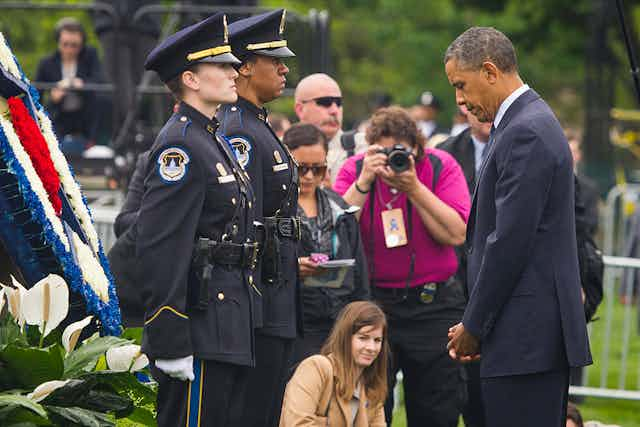Barack Obama was heckled last night as he delivered a landmark speech on counter-terrorism at the National Defense University in Washington. Medea Benjamin, an activist, repeatedly interrupted Obama’s speech, shouting that people were tired of “nice words” from the US president and that they wanted “concrete action”.
“Some say it’s rude to interrupt the president, but it’s rude to kill innocent people with drones,” she shouted, before being escorted from the room.
Obama made light of the interruption from the co-founder of Code Pink, a group opposed to United States military actions, but the incident tells us a lot about the gradual disintegration of the president’s relationship with both the media and a growing segment of liberal America.
How things have changed. Obama’s election in 2008 was greeted with euphoria not just in the United States, but around the world. The slogans associated with his campaign - “change we can believe in” and “yes we can” - reflected the high hopes for his time in the White House.
Five years on, the abiding image of the Obama Presidency is one of promise unfulfilled. Where did it all go wrong?
2008: making government ‘cool’
Obama’s first term, albeit difficult, saw a number of achievements. Troops were brought home from Iraq, there was a plan to reduce troop numbers in Afghanistan, the economy appeared to be in better shape than Europe and in Obamacare the president had achieved what so many of his predecssors had failed at, reform of the health care system.
Admittedly, not all Americans saw things in such a positive light, as reflected in the rise of the Tea Party movement and Republican gains in the 2010 mid-term congressional elections. Fox News found fault in everything associated with the President, from the policies of his administration through to the mustard on his burgers.
By 2012 some 67 bestselling anti-Obama books had been published. These depicted the President variously as a would-be dictator, a socialist radical, an Islamic extremist, and even the anti-Christ. The improbable nature of such claims, like those of the so-called “birther” movement that tried to cast doubt on Obama’s American citizenship, highlighted their main weakness.
But these seemed more the ideas of the “swivel-eyed” right-wing than the views of the majority. The mainstream media continued to show the President in a generally sympathetic light and his re-election in 2012 confirmed his continuing popularity with most voters.
The outlook for his second term looked promising. Experienced in office, he could build on existing achievements and, unable to prevent his return to the White House, the “fever” of the Republican opposition would break and subside.
2013: a return to Nixonian politics
All that now seems a distant memory. In 2013 the Obama administration has been beset by a series of crises and subject to increasing criticism, not just from the right, but from a growing number of “liberal” journalists. Influential voices have been raised in criticism, such as the New York Times’ Maureen Dowd, and Karen Tumulty, Philip Rucker and Peter Wallsten from the Washington Post which you would have expected to be sympathetic to a Democrat in the White House.
This cooling of Obama’s troubled relationship with the liberal press can be attributed to what Karen Tumulty has called a “scandal trifecta”: the failure of the White House to give full details of the killing of the US ambassador to Libya and three other Americans in Benghazi in September 2012; the apparent targeting of opponents of the administration by the Inland Revenue Service (IRS) and, perhaps most damagingly, reports that the Justice Department gained access to phone records of journalists working for the Associated Press.

The president’s response, in which he denyied knowledge of any wrongdoing, has contributed to a sense that he does not know what is going on in his own administration. At worst, it creates an impression, in the words of Maureen Dowd, that the “man who promised in 2008 to make government cool again is instead batting away charges that he has made government ‘Nixonian’ again”.
Another problem is Obama’s leadership style. Strong in defending American interests abroad - as reflected in the drone strikes and the killing of Bin Laden - he has seemed less resolute at home. This includes his failure to close Guantanamo as well as his inability to mobilise support in the Senate for tighter gun controls in the wake of the December 2012 school massacre in Newtown, Connecticut.
History is also not on the side of the president. In addition to traditional perceptions of re-elected incumbents as “lame ducks”, recent experiences of second term administrations - from Eisenhower to George W. Bush - are ones of scandal or failure. One thing seems certain. The problems facing President Obama over the next four years may differ from those of his first term, but they will be no less challenging.

